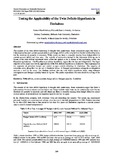Please use this identifier to cite or link to this item:
https://cris.library.msu.ac.zw//handle/11408/1583Full metadata record
| DC Field | Value | Language |
|---|---|---|
| dc.contributor.author | Mandishekwa, Robson | |
| dc.contributor.author | Tambudzai, Zachary | |
| dc.contributor.author | Marufu, Alex | |
| dc.date.accessioned | 2016-06-16T12:02:45Z | |
| dc.date.available | 2016-06-16T12:02:45Z | |
| dc.date.issued | 2014 | |
| dc.identifier.issn | 2222-1700 | |
| dc.identifier.uri | www.iiste.org/Journals/index.php/JEDS/article/download/18685/19134 | |
| dc.identifier.uri | http://hdl.handle.net/11408/1583 | |
| dc.description.abstract | The concept of the twin deficit hypothesis is fraught with controversy. Some economists argue that there is independence between current account deficits and budget deficit while some believe that the relationship exists but the direction of causality is uncertain. While others say there is causality running from budget deficit to current account deficit and vice versa. The majority of economists trained in the Keynesian thinking are in favour of the twin deficits hypothesis while others are against it but in favour of the contrasting theory, the Ricardian equivalence. The Ricardian equivalence hypothesis, argues that the two are independent. The major objective of the paper is to test the applicability of the twin deficits hypothesis to Zimbabwe. This is premised on the argument of persistent budget and current account deficits obtaining in Zimbabwe. The majority of researches done along this line are not in Southern Africa. A Granger representation alongside co-integration analysis is used in the study. The findings indicate that the twin deficit hypothesis holds using Johansen cointegration and Granger causality based on lag two. The public expenditure overruns should be a thing of the past. | en_US |
| dc.language.iso | en | en_US |
| dc.publisher | IISTE | en_US |
| dc.relation.ispartofseries | Journal of Economics and Sustainable Development;Vol.5, No.28; p. 206-217 | |
| dc.subject | Twin deficits | en_US |
| dc.subject | Current account | |
| dc.subject | Budget deficit | |
| dc.subject | Granger causality | |
| dc.subject | Zimbabwe | |
| dc.title | Testing the applicability of the twin deficits hypothesis in Zimbabwe | en_US |
| dc.type | Article | en_US |
| item.cerifentitytype | Publications | - |
| item.fulltext | With Fulltext | - |
| item.languageiso639-1 | en | - |
| item.openairecristype | http://purl.org/coar/resource_type/c_18cf | - |
| item.grantfulltext | open | - |
| item.openairetype | Article | - |
| Appears in Collections: | Research Papers | |
Files in This Item:
| File | Description | Size | Format | |
|---|---|---|---|---|
| Twin deficit paper.pdf | Abstract | 37.1 kB | Adobe PDF |  View/Open |
Page view(s)
178
checked on Jan 30, 2026
Download(s)
50
checked on Jan 30, 2026
Google ScholarTM
Check
Items in MSUIR are protected by copyright, with all rights reserved, unless otherwise indicated.



